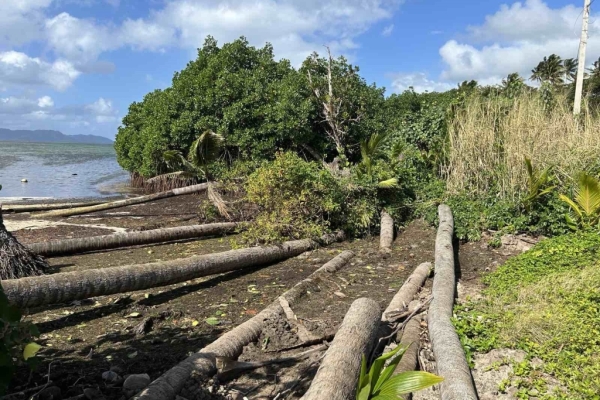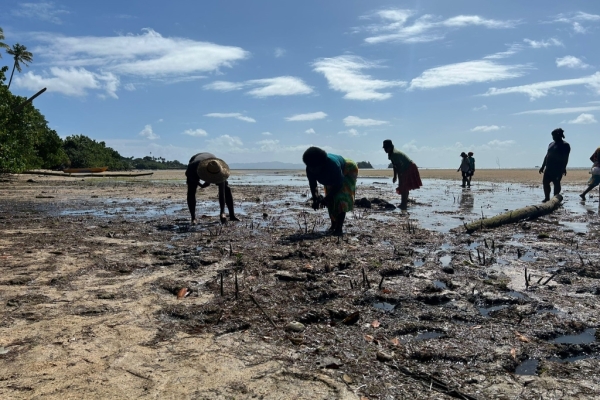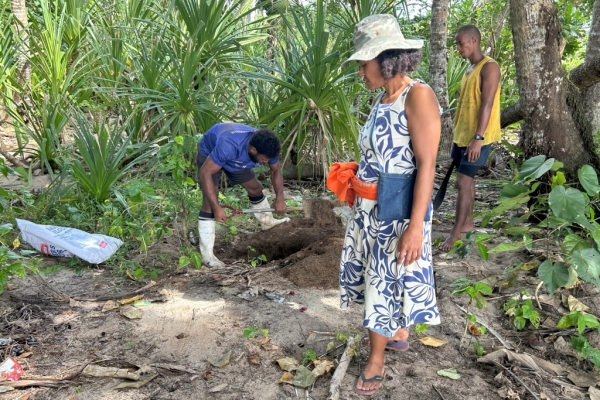
Navakacoa village is located on the northeastern coastline of Taveuni island, and its community is dependent on fish and marine resources for subsistence and livelihoods. However, over the years, the people of Navakacoa have been experiencing a decline in availability and abundance of fish.
They recall days when their parents and grandparents would fish near the coastline and the catch, they would bring home was large in number and in size. But they say times have changed and the supply has started to decline, and they are no longer able to fish close to shore but have to go further out to sea to get a decent size and supply of fish.
Among several contributing factors that includes overfishing and misuse of land it has also been the removal of mangroves along the coastlines that has affected the health of their coastal ecosystem. Its removal has been attributed to mangroves being a popular source of pole timber and firewood. According to Fiji’s National Mangrove Management Plan 2013, mangrove loss across Viti Levu, Vanua Levu, Taveuni and Kadavu between 1991 to 2007 is 3,464 hectares, which is an average loss of 217 hectares per year.
Navakacoa Village Headman, Mr. Mikaele Tawake, fondly known as the Mangrove Ranger has continuously pushed for the restoration and rehabilitation of mangroves along the coastlines of Taveuni’s Cakaudrove and Wainikeli districts.

“The northern side of Taveuni where mangroves exist on the island is where I’m from and we feel it’s our responsibility to protect them. My home is located by the coast and just outside are mangroves. I used to see big-sized crabs but when the removal of many mangroves started, I noticed the crabs slowly disappeared over the years,” said Mr. Tawake. “In 2006, women in my village started to notice the reduction of fish and talks began on how we can bring them back.”
Mangroves function as a critical nursery area for fish, crabs, prawns, mangrove lobsters, molluscs and the wider marine life and so a reduction in the health of mangroves affects the health of the life it nurtures. Mangroves act as a filter for pollutants and sediments that can reach seagrass and coral reef ecosystems, and they are also important for storage of atmospheric carbon.
“In 2008, a massive mangrove replanting campaign took place where we transplanted seedlings and did it consistently for two weeks. After two to three years when these mangroves were fully grown, we noticed the fish that were gone started reappearing,” said Mr. Tawake.
As a result, a decision was made at the Provincial Meeting or Bose ni Yasana for Cakaudrove in 2012 to ban the removal or cutting down of mangroves in Taveuni. The only exception made was for firewood used for home cooking, otherwise the people were instructed to protect the mangroves. However, due to the demand for road improvement and the running of power lines to villages along the coastal areas, the destruction of mangroves has started again on the island.

Mr. Tawake then started a nursery that currently nurses around 3,000 mangrove seedlings and carried out several replanting initiatives over the years, trialling planting methods in different seasons and locations.
To carry on the work, he recently partnered with the Navakacoa Youth Club and the Navakacoa Women’s Group to champion the restoration and rehabilitation of mangroves with support from the Kiwa Pacific Ecosystem-based Adaptation to Climate Change Plus (PEBACC+) Project.
During a consultation with the women and youth, Mr. Tawake emphasised the benefits the initiative will bring to their children and the future of Navakacoa. “If we are not active or if we don’t do anything about restoring and protecting our mangroves today, our children will hold us accountable to why there is no fish. We need to work together to replant mangroves along the Wainikeli and Cakaudrove districts where they normally grow,” said Mr. Tawake.
After agreeing to join efforts to replant mangroves and with the consent of the paramount chief of the Wainikeli district, Tui Wei, the women and youth arrived in numbers at the Naisogo Point on Friday 7 June 2024 for World Environment Day. They planted 300 coastal plants that would replace plants recently cleared to extend Energy Fiji Limited (EFL) electricity powerlines. A beach cleanup and extension planting of over 4,000 mangrove trees followed and this was the beginning of a new partnership to restore and rehabilitate mangroves.
President of the Navakacoa Women’s Group, Mrs. Akeneta Moceiqalitu said, “I’m grateful we’re being involved in this work because it will benefit us as a community. Mangroves are a habitat for fish and it’s important that we work together to replant these mangroves and other coastal plants that have been removed.”
“When I got married and moved to Navakacoa, I would find big fish whenever I go fishing whether during the day or night but now, we rarely find these big fish near our shores. We used to see at least the small ones in the mangrove areas but with the mangroves gone we don’t see them anymore.
She added, “When Mika and I talked about involving the women, I agreed because this is how we can help, and we’ve done projects before such as fundraising for a community hall and this is no different because it benefits everyone in the community.”
The Navakacoa Youth President, Mr. Pelasio Raibia said, “Our fathers continue to tell us the importance of caring for the environment and it’s good they involve the young people in these initiatives because it raises our awareness particularly now on mangrove restoration and how it affects our fish population.

“I dive and I see the change of our environment underwater, we would normally find a lot of fish and big ones close by but now we go further out because of the changing climate. With these type of initiatives like mangrove replanting, I hope to one day see the big fish my forefathers used to see.
He added, “We’re also looking at getting the commitment of the younger ones who will soon join the Youth Club and raise their awareness on the importance of protecting the environment so they can support the work we are doing, and it continues.”
Mr. Tawake along with the Youth Club and Women’s Group have a target of 10 hectares of mangrove replanting to complete under the Kiwa PEBACC+ Project. The goal is to use nature-based solutions and ecosystem-based adaptation (EbA) to climate change approaches to restore and rehabilitate mangroves in Taveuni. This will help trap sediment and protect freshwater seeps, providing an important rearing habitat for fish and shellfish.
“I believe we can restore our marine resources when we plant more mangroves and I continue to state this at the Bose ni Tikina. I believe it will bring back the big size fish we used to see before and other marine species that have disappeared,” said Mr. Tawake.
“Even when PEBACC+ finishes, we will continue to take ownership and carry on the mangrove restoration work because this is not only for us, but also for the next generation. This is what we want to leave behind; when our children reap the benefits of our work, they will think of us.”
The Kiwa PEBACC+ Project is working in Taveuni with the Cakaudrove Provincial Office, Ministry of Fisheries and Forest, Ministry of Agriculture and Waterways. At community level, the project is working closely with traditional leaders with the inclusion of women and youth groups on EbA initiatives such as with Navakacoa.
“These efforts are part of the project’s overall support to Taveuni that also includes the reforestation of key ecosystems and extend forest cover on key catchment areas,” said Mrs. Loraini Sivo, Kiwa PEBACC+ Project Manager and Fiji Coordinator, Secretariat of the Pacific Regional Environment Programme.
“The project is also looking at agroforestry to be implemented in the 100 metre buffer zones around the Taveuni Forest Reserve. Coastal protection not only includes mangrove replanting, it goes back to also include proper management of land-based activities such as the expansion of agricultural land,” she added.
PEBACC+ is a regional project implemented by the Secretariat of the Pacific Regional Environment Programme and funded by the Kiwa Initiative – through its donors the European Union, Agence française de développement, Global Affairs Canada, Australian Government Department of Foreign Affairs and Trade and New Zealand Ministry of Foreign Affairs and Trade – with co-financing from the French Facility for Global Environment. This four-year project seeks to strengthen the resilience of ecosystems, economies, and people to the impacts of climate change in Fiji, Vanuatu, Solomon Islands, New Caledonia, and Wallis and Futuna. The project will develop, sustain, and institutionalize the Ecosystem-based Approach (EbA) to climate change adaptation in these five countries and territories.